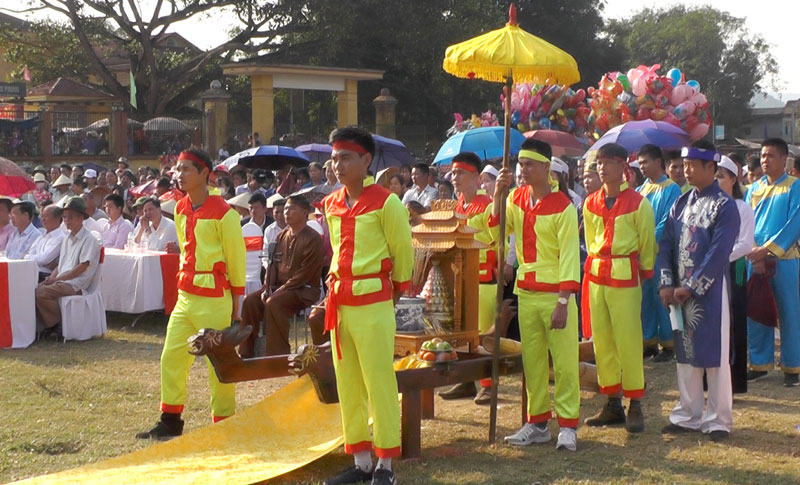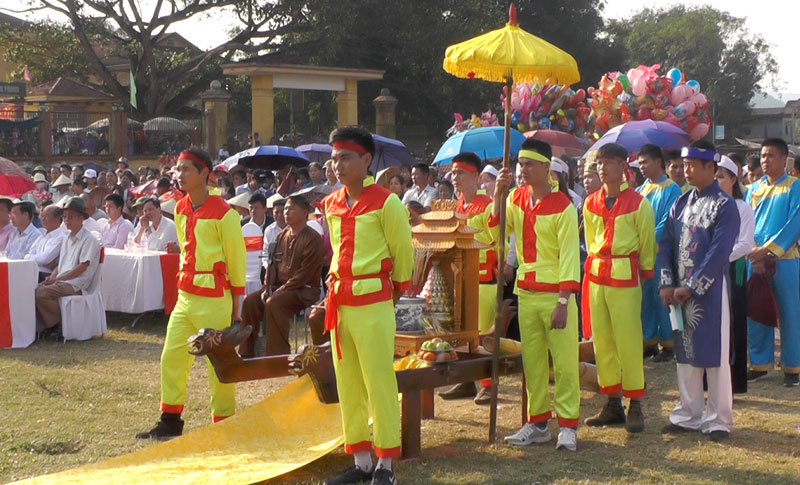
(HBO) - On January 31st (ie, the 7th day of Lunar New Year), at the stadium of Dung Phong commune (Cao Phong), the People's Committee of Cao Phong district held Khai Mua Muong Thang Festival in the spring of 2020. The leaders from the appropriate authorities of the province, the leaders from the People's Committees of the districts and the city and a large number of people in the district attended the festival.
 The procession worshiping the village's God and the procession of water to the festival.
The procession worshiping the village's God and the procession of water to the festival.
Khai Mua Festival is a long-standing traditional cultural beauty imbued with the identity of Muong Thang people and it has an important meaning in the lives of the people here. The festival takes place with 2 parts including the ceremony and the festival. The ceremony was solemnly held with rituals of worshiping and welcoming the God of the village from Mieu Ca and the magical water from the ancient well of Dong Ngoai hamlet to the stadium of Dung Phong commune.
After the ceremony is the festival with displaying the local food stalls; cultural, art, sports performances and folk games such as throwing cotton ball, tug of war, stick pushing, crossbow shooting, volleyball competition for men and women.
Khai Mua Muong Thang Festival is held on the 7th and 8th of January every year so that the people can show their respects and thanks to the Three Saints Son Thanh who blessed the Muong people a lucky, full and happy year with good wind, good harvest and the village is always full.
With an increasingly vibrant and widespread emulation movement aimed at building cultured residential areas and cultured families, Yen Thuy District has been making steady progress toward improving both the material and spiritual well-being of its people, while fostering a civilized, prosperous, beautiful, and progressive community.
Once lacking recreational spaces and community facilities, Residential Group 2 in Quynh Lam Ward (Hoa Binh City) has recently received attention for the construction of a new, spacious, and fully equipped cultural house. The project followed the model of state support combined with public contributions in both labor and funding.
The "All people unite to build cultural life" movement, which has been effectively integrated with Kim Boi district’s socio-economic development goals, is fostering a lively spirit of emulation across local residential areas, hamlets, villages, public agencies, and enterprises. In addition, through the initiative, traditional cultural values are being preserved and promoted, while community solidarity and mutual support in poverty reduction and economic development are being strengthened.
A working delegation of the Hoa Binh provincial People’s Committee led by its Permanent Vice Chairman Nguyen Van Toan on June 11 inspected the progress of a project to build the Mo Muong Cultural Heritage Conservation Space linked to tourism services in Hop Phong commune, Cao Phong district.
Born and growing in the heroic land of Muong Dong, Dinh Thi Kieu Dung, a resident in Bo town of Kim Boi district, in her childhood was nurtured by the sweet lullabies of her grandmother and mother. These melodies deeply imprinted on her soul, becoming an inseparable part of her love for her ethnic group's culture. For over 20 years, this love for her hometown has driven Dung to research, collect, and pass down the cultural values of the Muong people to future generations.
In the final days of May, the Ethnic Art Troupe of Hoa Binh Province organized performances to serve the people in remote, mountainous, and particularly disadvantaged areas within the province. These were not just ordinary artistic shows, but they were the meaningful journeys aimed at spreading cultural values, enhancing the spiritual life of the people and contributing to the preservation of ethnic minority cultural identities.



 The procession worshiping the village's God and the procession of water to the festival.
The procession worshiping the village's God and the procession of water to the festival.